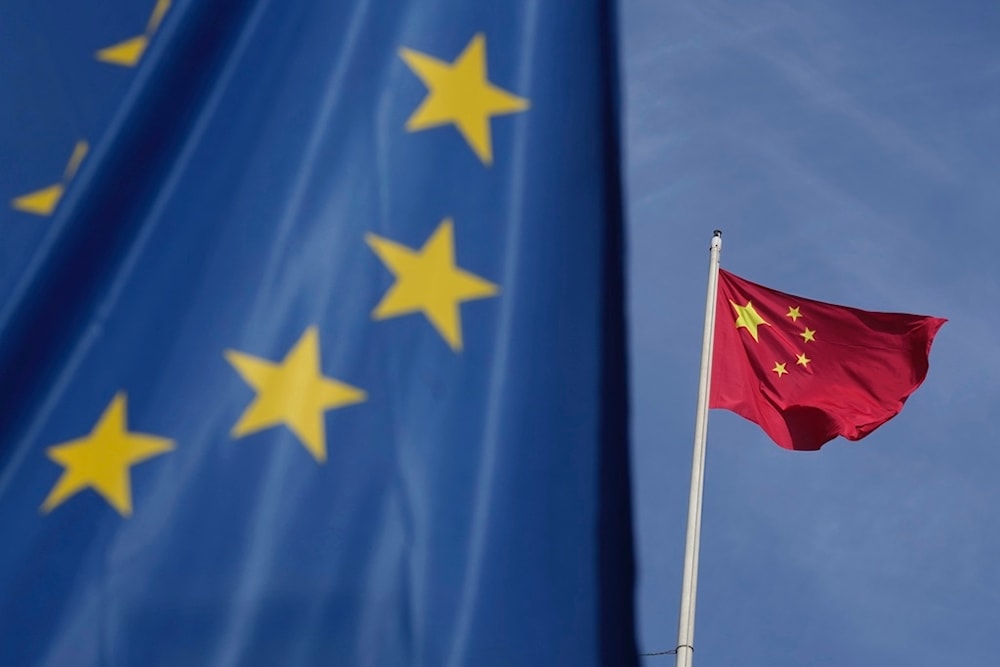UnHerd: Decoupling from China, can Europe recover?
An UnHerd analysis shows how the US' China policy would affect its economy, comparing it to Europe, and the ramifications that would follow.
-

Chinese national flag is raised at the Chinese embassy in London, Monday, September 11, 2023 (AP)
When US Secretary of State Antony Blinken went to China on a diplomatic visit last week, he was faced with two ultimatums that would shape American foreign policy toward the Eastern giant; Either confront or cooperate.
A report by Philip Pilkington on UnHerd stated that the message relayed to the US, following meetings between Blinken and several Chinese officials, including President Xi Jinping, was the mutual respect in regard to the development of both countries.
China reportedly welcomed US prosperity, but demanded reciprocity, saying “We hope that the US side can also view China’s development in a positive and proactive light,” simultaneously warning of unhealthy competition.
China's economic growth, coupled with the absence of a clear US strategy to counter or compete with Chinese development, has gained traction in both the US and Europe. John Paulson, a Donald Trump megadonor and hedge fund giant, slammed Biden's administration's Chinese policy, or rather its lack, warning against decoupling from China, a call echoed among American experts as well, to avoid an inevitable collapse of the country's economy.
Would Europe recover?
The same predicament looms over Europe, the UnHerd report speculated. As governments call for the preservation of trade relations with China, their actions materialize differently. For example, Germany arrested Chinese nationals under claims of espionage.
This comes amid a probe launched by the European Commission investigating TikTok, which coincides with the US investigation and recently passed bill that could ban the platform in the country.
However, should Europe expel the Chinese from the continent, its economy would face collapse. Europe, along with the United Kingdom, stands as the world's most dependent region on external trade. While in 2022, imports accounted for less than 10% of North America's GDP, in Europe, they constituted nearly 47% of GDP. The continent is nearly five times more reliant on imports than North America.
In the US, a decision to sever ties with China would likely lead to increased inflation and a significant decline in American living standards due to the disappearance of affordable Chinese imports. However, if the US could manage the social unrest caused by declining living conditions, theoretically, the country could adapt to the situation.
In Europe, however, the situation differs. Europe has already suffered major blows due to the sanctions imposed on Russian gas and oil amid the war in Ukraine. Cutting off Chinese trade, thus, would inflict irreversible damage.
According to UnHerd, Europe is not interested in breaking economic ties with China. However, emotions are heightened in the aftermath of the Ukraine conflict, which isn't unfolding favorably for Europe. Consequently, there's a tendency to adopt the most aggressive and confrontational policies circulating. Yet, this mindset is unlikely to persist.
Read more: Why Europe needs to repair ties with China
Europe cannot realistically abandon China
European Commission President Ursula von der Leyen stated in February that the EU relies completely on China for lithium, as the bloc imports 97% of its required supply of the material from the country.
"We have observed that China, over the last 20 to 30 years, has strategically bought mine after mine globally. They take the raw material, they have the processing procedures in China and then they have the monopoly for this raw material. Take lithium: 97% of the lithium we use in the European Union is from China. So we are totally dependent on this one on China," von der Leyen said during her opening speech at the Clean Tech Industry Dialogue in Brussels.
Media reports in September 2023 indicated that the EU faced the possibility of becoming equally dependent on China for lithium-ion batteries by 2030 as it had been on Russia for fossil fuels before the latter initiated its special military operation in Ukraine in February 2022.

 4 Min Read
4 Min Read








